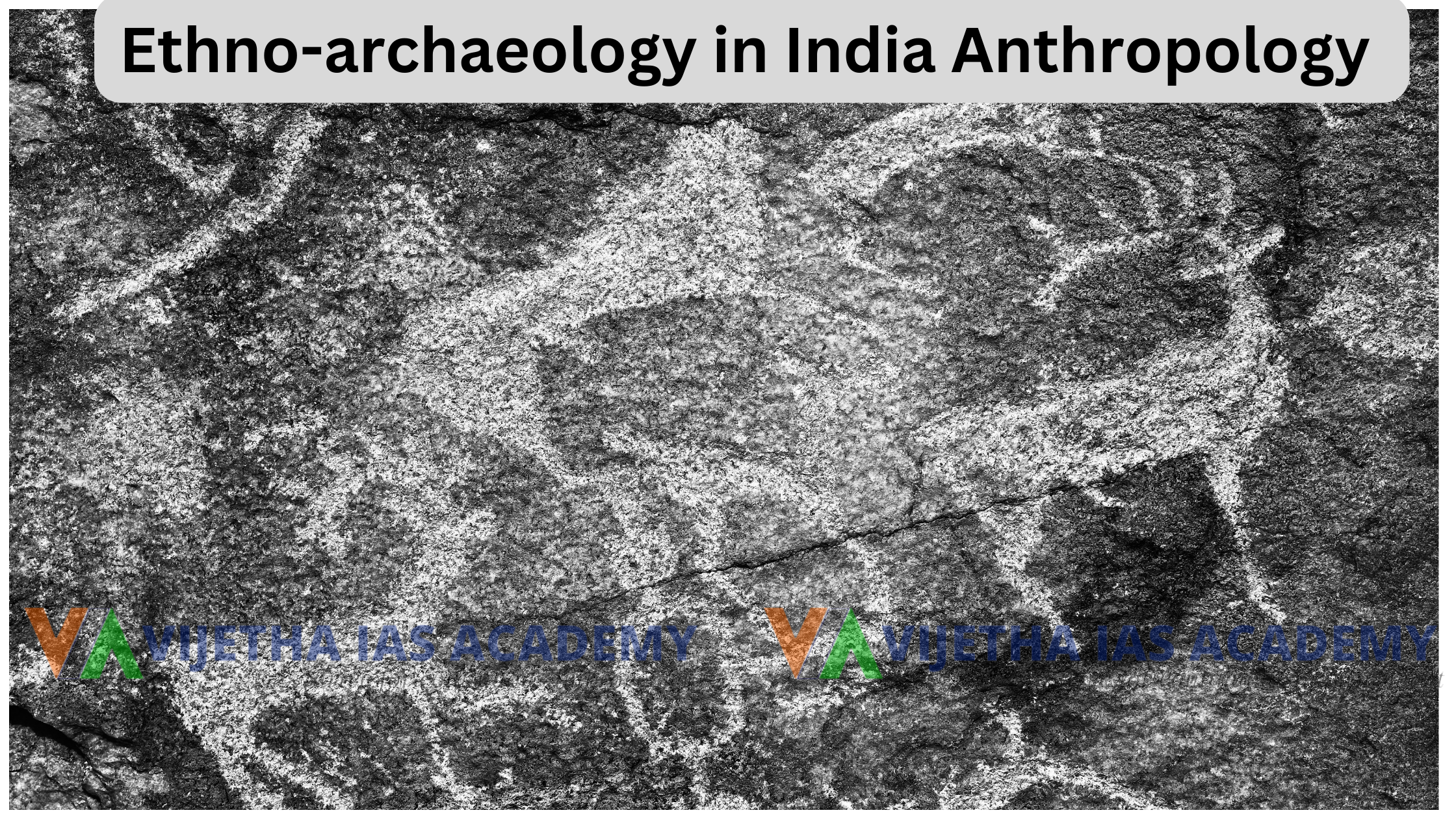
Ethno-archaeology in India: An Insightful Study for Anthropology Optional in UPSC
Ethno-archaeology is a fascinating subfield of archaeology that bridges the gap between past and present human societies by studying contemporary cultures to understand ancient ones. In the context of India, this discipline offers rich insights into the lives, practices, and artifacts of ancient populations. For UPSC aspirants choosing Anthropology as their optional subject, ethno-archaeology is a vital area of study. Vijetha IAS Academy and Kishore Sir Anthropology provide exceptional resources and guidance to master this topic, crucial for the Anthropology optional syllabus.
What is Ethno-archaeology?
Ethno-archaeology involves the study of living communities to draw parallels and make inferences about ancient societies. By observing current human behaviors, settlement patterns, tool usage, and other cultural practices, ethno-archaeologists can formulate hypotheses about how ancient people might have lived. This methodology helps bridge the interpretative gap in archaeology, offering a dynamic way to understand the past.
Importance of Ethno-archaeology in India
India's diverse cultural and ethnic landscape makes it an ideal setting for ethno-archaeological studies. The country is home to numerous indigenous tribes and rural communities whose lifestyles and traditions have remained relatively unchanged over centuries. These communities provide a living laboratory for studying ancient human behaviors and material culture.
Key Contributions of Ethno-archaeology in India
-
Understanding Prehistoric Tools and Technology:
- Studies of contemporary tribal communities, such as the Bhil and Gond, have shed light on prehistoric tool-making techniques. By observing these communities, researchers have gained insights into the manufacturing processes, usage, and significance of stone tools.
-
Settlement Patterns and Architecture:
- Ethno-archaeologists study the dwelling structures of tribes like the Toda and Nicobarese to understand the architectural practices of ancient civilizations. These studies help in reconstructing the spatial organization and social structures of prehistoric settlements.
-
Subsistence Strategies:
- The examination of current agricultural and hunting practices among tribes such as the Santhals and Khasis provides valuable information about the subsistence strategies of ancient communities. This includes insights into crop selection, animal domestication, and foraging behaviors.
-
Cultural and Ritual Practices:
- Ethno-archaeological research into the religious and ceremonial practices of contemporary tribes helps decode the symbolic and ritualistic aspects of ancient cultures. The study of festivals, rituals, and other cultural expressions among tribes like the Naga and Bhotia contributes to a deeper understanding of the spiritual lives of early humans.
Ethno-archaeology in the UPSC Anthropology Syllabus
For the UPSC Anthropology optional, ethno-archaeology is integrated within the broader context of archaeological anthropology. The syllabus covers various aspects, including the methodologies and theoretical frameworks used in ethno-archaeological studies, and specific case studies relevant to India.
Key Topics in Ethno-archaeology for UPSC
-
Theoretical Frameworks:
- Understanding the concepts and theories that underpin ethno-archaeological research is essential. This includes studying different models of cultural continuity and change, as well as the principles of analogy and ethnographic parallels.
-
Methodologies:
- Aspirants should familiarize themselves with the various methodologies used in ethno-archaeology, such as participant observation, interviews, and the study of material culture. Learning about these techniques helps in comprehending how contemporary practices are used to interpret ancient ones.
-
Case Studies from India:
- Detailed case studies of Indian tribes and their relevance to archaeological interpretations are crucial. Examples include the study of the basket-making techniques of the Irulas, the pottery practices of the Kumhars, and the settlement patterns of the Bhils.
-
Applications of Ethno-archaeology:
- Understanding how ethno-archaeological findings are applied to solve archaeological problems is important. This includes studying how these insights contribute to site excavation, artifact analysis, and the reconstruction of ancient lifeways.
Why Choose Vijetha IAS Academy for Ethno-archaeology?
Vijetha IAS Academy offers a well-structured program for Anthropology optional, with a special focus on ethno-archaeology under the expert guidance of Kishore Sir Anthropology. Here are some reasons to choose this academy:
- Expert Faculty: Kishore Sir is renowned for his expertise in Anthropology, providing deep insights and clear explanations of complex topics.
- Comprehensive Study Material: The academy provides detailed notes and resources that cover all aspects of the syllabus, including ethno-archaeology.
- Strategic Preparation: The courses are designed to focus on key areas, helping students to effectively prepare for the examination and maximize their scores.
- Interactive Learning: Classes are interactive, encouraging discussions and questions to ensure a thorough understanding of the subject matter.
For more information on their courses, visit their Anthropology Courses.
Preparing for Ethno-archaeology with Vijetha IAS Academy
Structured Curriculum
Vijetha IAS Academy offers a curriculum specifically tailored to cover all aspects of ethno-archaeology. This structured approach ensures that students understand the theoretical frameworks, methodologies, and practical applications of the subject.
Regular Assessments
The academy conducts regular tests and assessments to monitor students' progress and understanding. These evaluations help in identifying areas of improvement and providing targeted feedback.
Personalized Attention
With a focus on individual attention, Kishore Sir and other faculty members address each student's queries and provide personalized strategies for tackling complex topics.
Access to Resources
Students gain access to a vast array of study materials, including books, research papers, and previous years' question papers. These resources are crucial for an in-depth understanding and effective preparation for the UPSC examination.
Conclusion
Ethno-archaeology offers a unique and insightful perspective on human history, bridging the gap between past and present. For UPSC aspirants, mastering this subject is essential for a strong performance in the Anthropology optional. Vijetha IAS Academy and Kishore Sir Anthropology provide the perfect platform for this, with expert guidance, comprehensive study materials, and a strategic approach to preparation. To explore their courses and take a step closer to your UPSC goals, visit Vijetha IAS Academy's Anthropology Courses.
